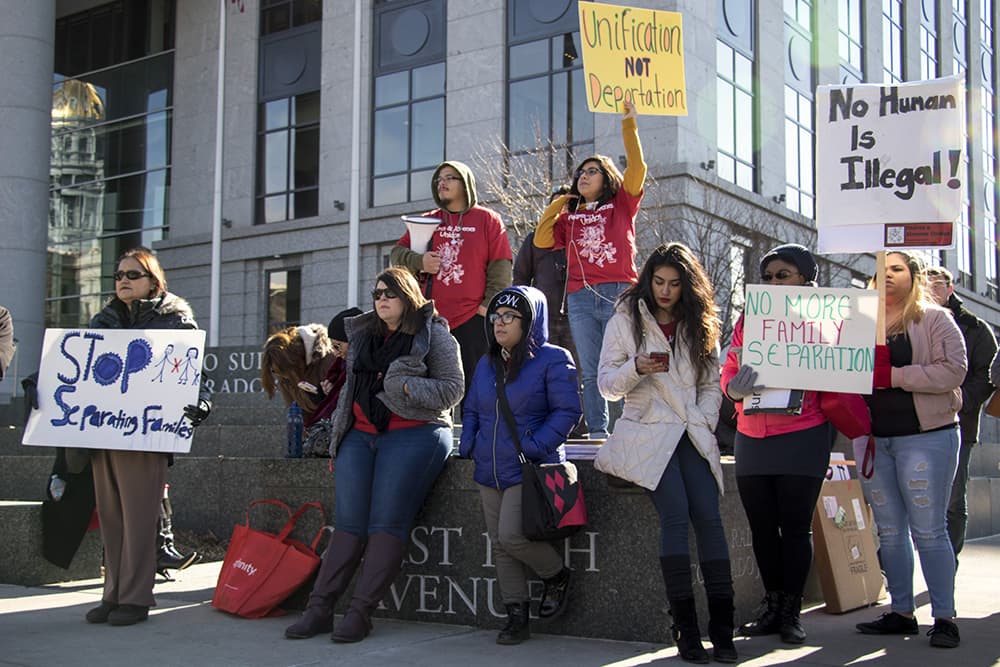
President Donald Trump promised on the campaign trail to take federal funding away from "sanctuary cities" -- those where local law enforcement does not cooperate with immigration enforcement -- but the scope of the executive order he signed Wednesday is broader than what some anticipated or what the courts have allowed in the past.
When the federal government withholds money to get compliance from local governments, the money typically has to have some relationship to the policy priority the feds have in mind. The executive order says that cities that don't cooperate with federal law enforcement are not eligible for ANY federal grants, except those "deemed necessary for law enforcement purposes." That would have a much larger impact than just targeting law enforcement grants, but it could also be open to a legal challenge.
"The reason why we're even having a conversation about cutting funding for sanctuary cities is because the federal government does not have the legal authority to force states and cities and counties to do their bidding. The 10th amendment does not allow the federal government to co-opt local officials," said Christopher Lasch, an associate professor at the University of Denver's Sturm College of Law.
Denver, Aurora and Boulder all have policies of not enforcing immigration law. Many law enforcement officials say enforcing immigration law makes it less likely that victims and witnesses will come forward.
Officials with all three cities simply asserted Wednesday that they are not sanctuary cities. Even Boulder, which just formally declared itself a sanctuary city, said it is not a sanctuary city because it's not violating federal law, spokeswoman Sarah Huntley said.
Lasch said that the Fourth Amendment means cities shouldn't hold immigrants without a warrant from federal immigration authorities, and the 10th Amendment means the federal government can't make local jurisdictions enforce federal laws.
Beyond that, Lasch said Congress, not the president, determines federal spending, and cities would be able to sue if the federal government withholds grants that have nothing to do with immigration enforcement.
"Funding conditions have to be reasonably related to the source of the funding," he said.
Local leaders have pledged to protect their residents and keep families together, but it's not clear whether the loss of significant funding would change that. Denver got about $175 million in federal funding in 2015, Boulder got more than $8 million, some of that in flood recovery money, and Aurora got $11.5 million.
Trump has focused on the victims of immigrants who are in the country illegally who commit crimes, and his executive order also calls for the creation of a special office within the Department of Homeland Security to advance the interests of victims and their families. He brought the survivors of several murder victims to the Department for the signing of the orders.
"The families they don’t talk about are the families of Americans forever separated from the people they love. As your president, I have no higher duty than to protect the lives of the American people," he said.
By just about any metric, immigrants, including those here illegally, commit crimes at lower rates than people born in the U.S.
Boulder took the formal step of declaring itself a sanctuary city.
At a protest of immigration policy in front of the state Capitol on Wednesday, Ana Rodriguez from the Colorado People’s Alliance said the community felt under attack.
"We have been singled out as immigrants, but we are committed to protecting each other and holding our elected officials accountable for protecting us too," she said. "The criminalization of immigrants hurts all of us, hurts relationships with law enforcement and makes us all unsafe."
"It is ironic and very scary that the current president of the United States is trying to punish communities and law enforcement for upholding the constitution," said Gabriela Flora, program director for the American Friends Service Committee, which advocates for immigrants.
Trump's executive order would also:
- Give the federal government the authority to determine which cities are sanctuary cities based on "statute, policy or practice" that hinders the enforcement of immigration laws;
- Make public a list of "criminal actions committed by aliens" on a weekly basis;
- Triple the number of immigration enforcement officers and increase the number of Border Patrol agents to 5,000;
- Take "immediate" steps to start construction of a wall along the Mexican border;
- And end the policy of "catch and release," under which people caught near the border are sent back to Mexico without formal deportation proceedings.
Lasch said the list of cities that don't honor immigration detainers has grown from a few dozen a few years ago to more than 500 today. The list of cities could just as easily be titled the list of cities that respect the Fourth Amendment, he said.
At the same time, the prospect of losing millions of dollars may intimidate some cities into compliance, Lasch said.
"It's a chilling prospect for them," he said.
Chloe Aiello contributed to this story.












